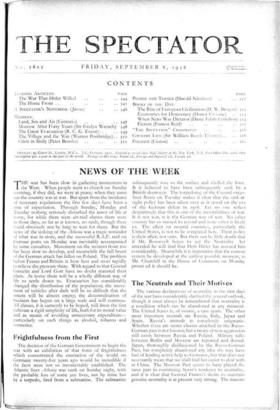The Neutrals and Their Motives The various declarations of neutrality
in the first days of the war have considerably clarified the general outlook, though it must always be remembered that neutrality is a condition which can be abandoned at any moment. The United States is, of course, a case apart. The other most important neutrals are Russia, Italy, Japan and Spain. Russia's attitude is completely enigmatic. Whether there are secret clauses attached to the RussoGerman pact is not known; but a treaty of non-aggression still exists between Russia and Poland. Military talks between Berlin and Moscow are reported and denied. Japan, thoroughly disillusioned by the Russo-German Pact, has completely abandoned any idea she may have had of lending active help to Germany, but that does not necessarily mean that we shall find her easier to deal with in China. The Moscow Pact seems to have played the same part in confirming Spain's tendency to neutrality, and it is clear that General Franco's desire to maintain genuine neutrality is at present very strong. The reasons for Italy's attitude are to some extent a matter for speculation; it is worth remembering that she was a neutral for the first nine months of the last war. Herr Hitler's references to her neutrality were peculiarly cordial, but it does not seem likely that she has any present intention of entering the war later on the German side. While neutrality is welcome to us in all these cases, continuous vigilance will be necessary lest it should bc applied in a manner favoutable to Germany. Hungary, Rumania and Yugoslavia will keep neutral if they can.























